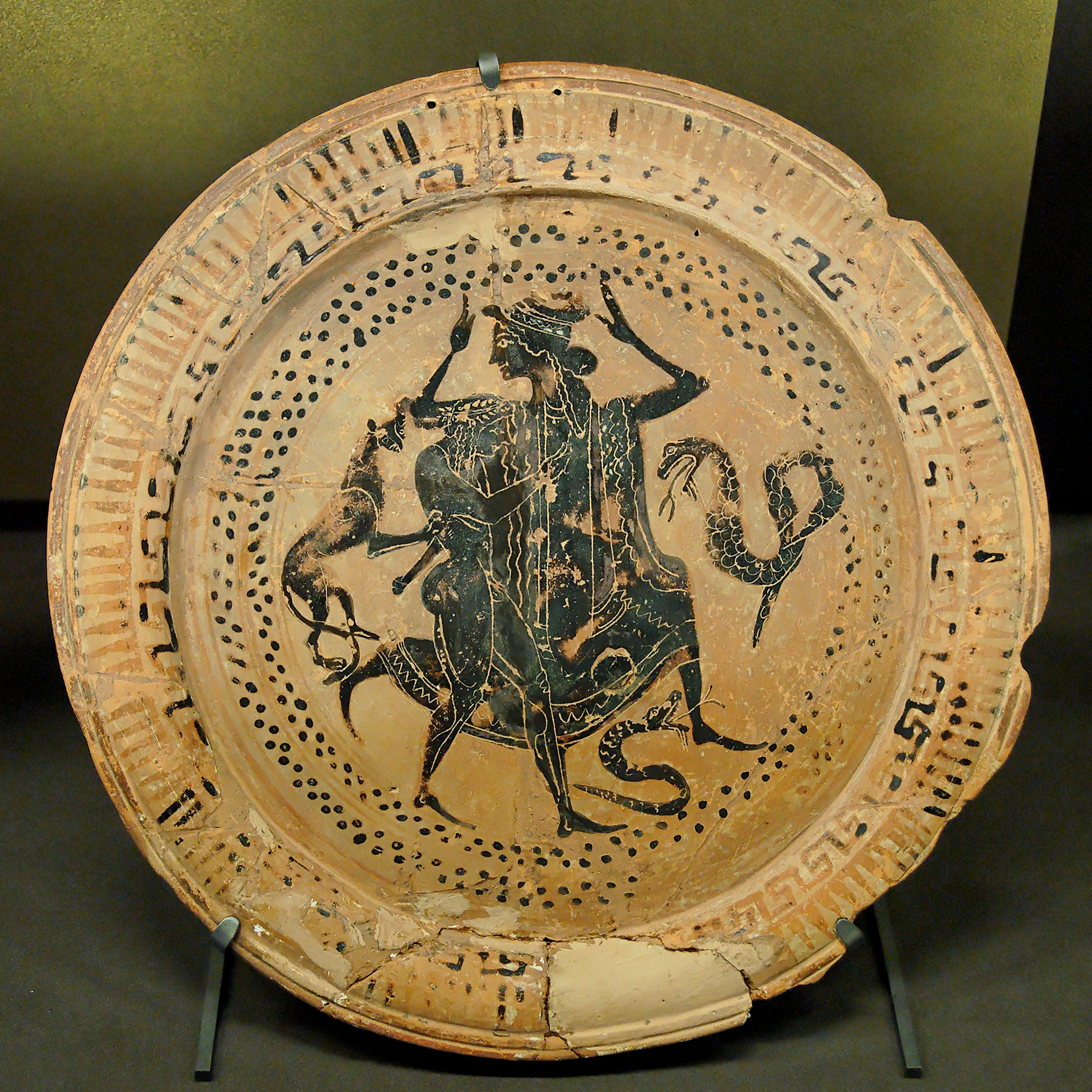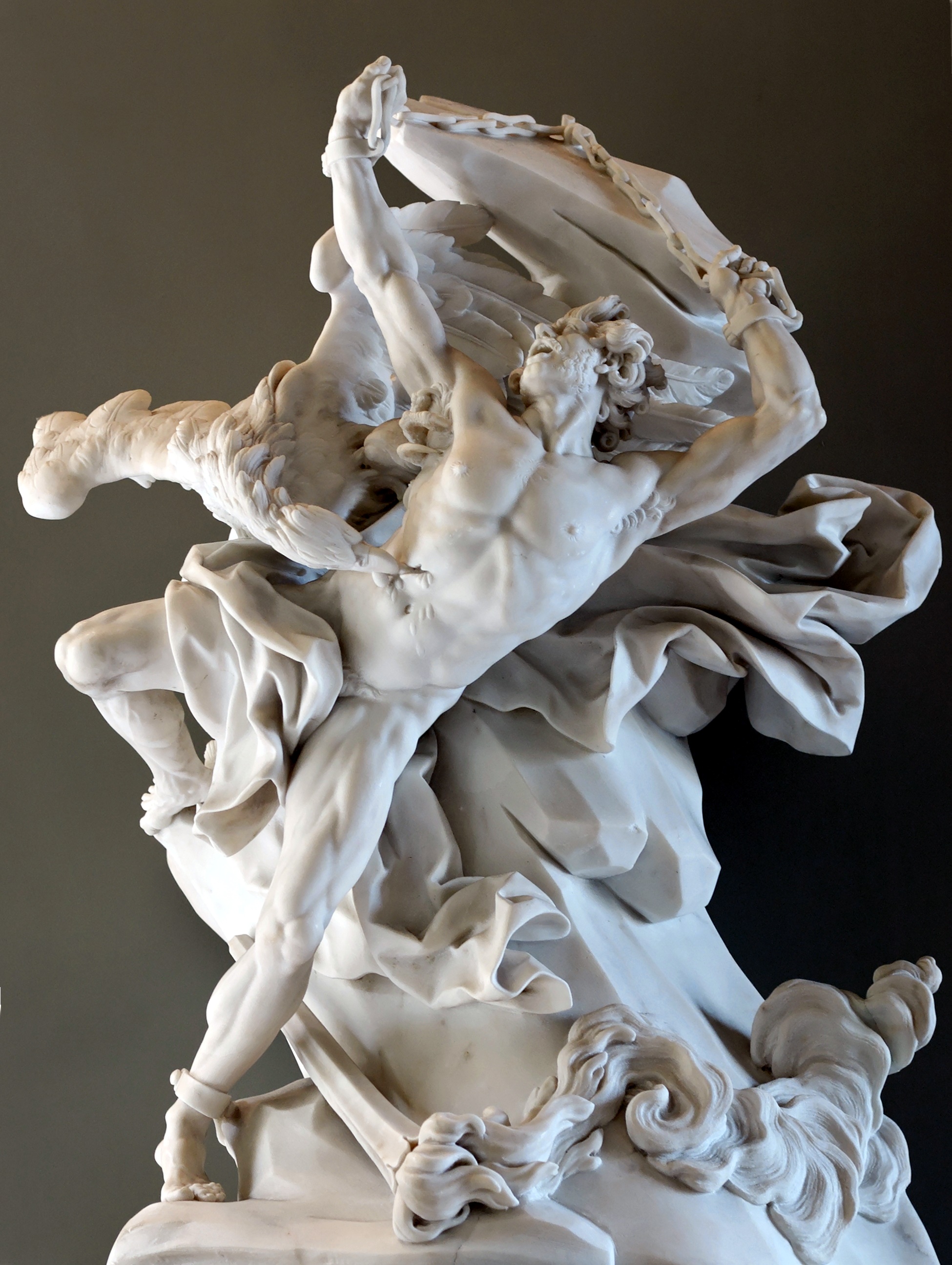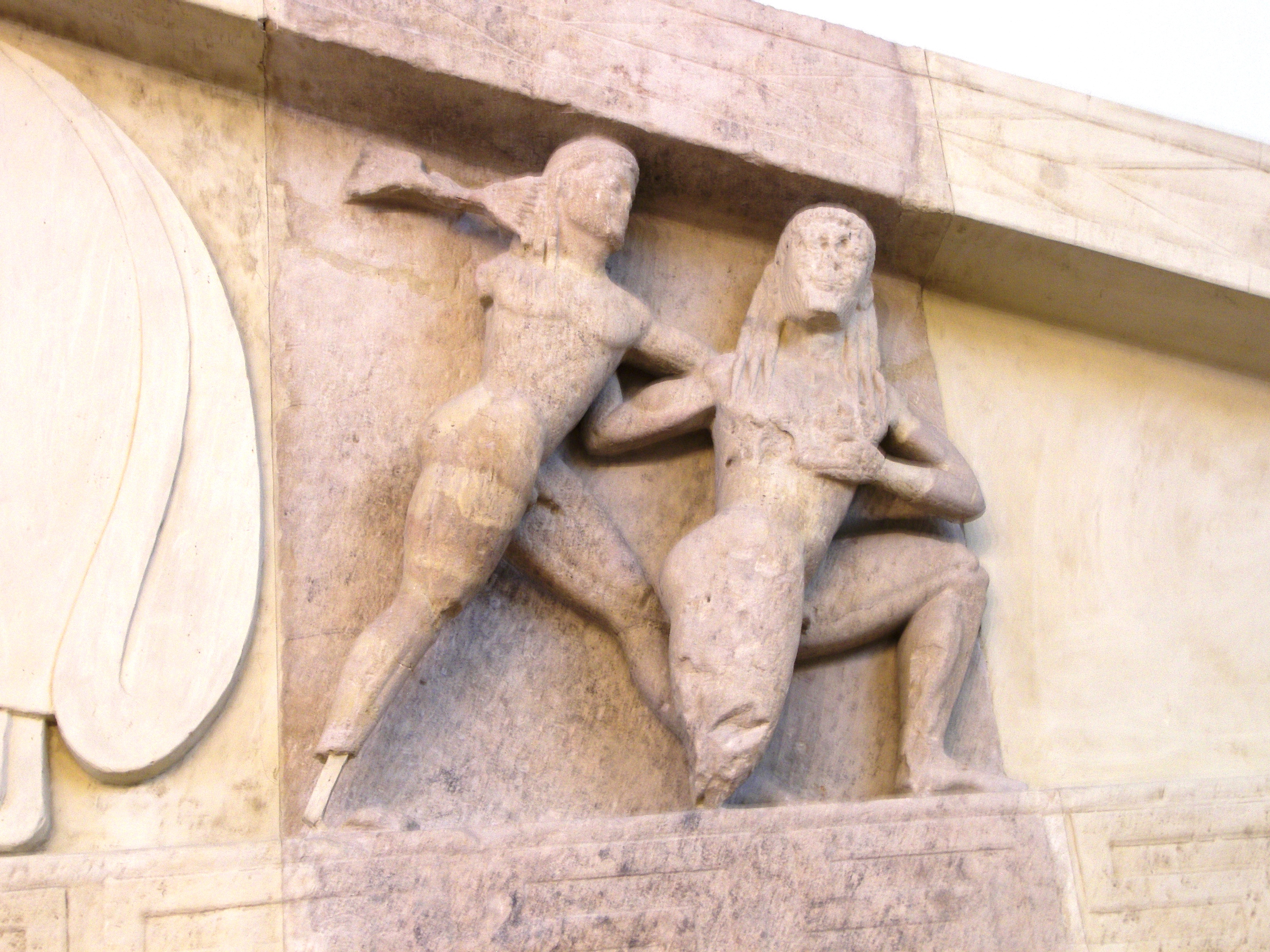|
Arke (mythology)
In Greek mythology, Arke or Arce () is one of the daughters of Thaumas, and sister to the rainbow goddess Iris. During the Titanomachy, Arke fled from the Olympians' camp and joined the Titans, unlike Iris who remained loyal to Zeus and his allies. After the war was over and the Titans with their allies were defeated, Zeus cut off her wings and cast Arke into Tartarus to be kept imprisoned for all eternity. Family and attributes The goddess Arke was born to Thaumas, a minor god; no mother of hers is mentioned anywhere. She and her sister Iris were both messenger deities; Iris is notably also the goddess of the rainbow, but unlike her Arke has not got any established connection to rainbows. Like Iris however Arke also sported wings which might be a nod to some primeval force or element she represented, but it is not clear what that would be. Mythology During the divine war known as the Titanomachy, Arke and Iris originally sided with the Olympian gods, but soon after Arke bet ... [...More Info...] [...Related Items...] OR: [Wikipedia] [Google] [Baidu] |
Eleusis
Elefsina () or Eleusis ( ; ) is a suburban city and Communities and Municipalities of Greece, municipality in Athens metropolitan area. It belongs to West Attica regional unit of Greece. It is located in the Thriasio Plain, at the northernmost end of the Saronic Gulf. North of Elefsina are Mandra, Greece, Mandra and Magoula, Attica, Magoula, while Aspropyrgos is to the northeast. It is the site of the Eleusinian Mysteries and the birthplace of Aeschylus. Today, Elefsina is a major industrial centre, with the largest oil refinery in Greece as well as the home of the Aeschylia Festival, the longest-lived arts event in the Attica Region. On 11 November 2016, Elefsina was named the European Capital of Culture for 2021, which became effective in 2023 due to the COVID-19 pandemic postponement. Etymology The word ''Eleusis'' first appears in the ''Orphic Hymn to Eleusinian Demeter'': «Δήμητρος Ελευσινίας, θυμίαμα στύρακα». Also Hesychius of Alexand ... [...More Info...] [...Related Items...] OR: [Wikipedia] [Google] [Baidu] |
Thetis
Thetis ( , or ; ) is a figure from Greek mythology with varying mythological roles. She mainly appears as a sea nymph, a goddess of water, and one of the 50 Nereids, daughters of the ancient sea god Nereus. When described as a Nereid in Classical myths, Thetis was the daughter of Nereus and Doris (Oceanid), Doris, and a granddaughter of Tethys (mythology), Tethys with whom she sometimes shares characteristics. Often she seems to lead the Nereids as they attend to her tasks. Sometimes she also is identified with Metis (mythology), Metis. Some sources argue that she was one of the earliest of deities worshipped in Archaic Greece, the oral traditions and records of which are lost. Only one written record, a fragment, exists attesting to her worship and an early Alcman hymn exists that identifies Thetis as the creator deity, creator of the universe. Worship of Thetis as the goddess is documented to have persisted in some regions by historical writers, such as Pausanias (geograp ... [...More Info...] [...Related Items...] OR: [Wikipedia] [Google] [Baidu] |
Oceanid
In Greek mythology, the Oceanids or Oceanides ( ; , ) are the nymphs who were the three thousand (a number interpreted as meaning "innumerable") daughters of the Titans Oceanus and Tethys. Description and function The Oceanids' father Oceanus was the great primordial world-encircling river, their mother Tethys was a sea goddess, and their brothers the river gods (also three thousand in number) were the personifications of the great rivers of the world. Like the rest of their family, the Oceanid nymphs were associated with water, as the personification of springs. Hesiod says they are "dispersed far and wide" and everywhere "serve the earth and the deep waters", while in Apollonius of Rhodes' ''Argonautica'', the Argonauts, stranded in the desert of Libya, beg the "nymphs, sacred of the race of Oceanus" to show them "some spring of water from the rock or some sacred flow gushing from the earth". The Oceanids are not easily categorized, nor confined to any single function, no ... [...More Info...] [...Related Items...] OR: [Wikipedia] [Google] [Baidu] |
Doris (Oceanid)
Doris (; Ancient Greek: Δωρίς/Δωρίδος means 'bounty'), in Greek mythology, was a sea goddess. She was one of the 3,000 Oceanids, daughters of the Titans Oceanus Aelian, ''De Natura Animalium'' 14.28 and Tethys. Etymology The name Doris is derived from the noun for a gift, δῶρον, from Proto-Indo-European *déh₃rom of the same meaning. Function When not associated with a god, Doris represented the fertility of the ocean, goddess of the rich fishing-grounds found at the mouths of rivers where fresh water mingled with the brine. Family Being an Oceanid meant she was a sister of the river gods. By her husband Nereus, Doris was the mother of Nerites and mother to the fifty Nereids, including Thetis, Amphitrite and Galatea. Namesake Doris Cove in Antarctica is named after the goddess. SCAR Compo ... [...More Info...] [...Related Items...] OR: [Wikipedia] [Google] [Baidu] |
Nereus
In Greek mythology, Nereus ( ; ) was the eldest son of Pontus (the Sea) and Gaia ( the Earth), with Pontus himself being a son of Gaia. Nereus and Doris became the parents of 50 daughters (the Nereids) and a son ( Nerites), with whom Nereus lived in the Aegean Sea. Name The name Nereus is absent from Homer's epics; the god's name in the Iliad is the descriptive , and in the Odyssey the combination of and .; ; Besides Nereus and Proteus, the descriptive "Old Man of the Sea" was used for other water deities in Greek mythology who share several traits, among them Phorcys, Glaucus, and perhaps Triton. It is suggested that the "Old Man of the Sea" had at one time played a cosmogonic role comparable to that of Oceanus and could have received different names in different places. It is not known whether the name Nereus was known to Homer or not, but the name of the Nereids is attested before it and can be found in the Iliad. Since Nereus only has relevance as the father o ... [...More Info...] [...Related Items...] OR: [Wikipedia] [Google] [Baidu] |
Pontus (mythology)
__NOTOC__ In Greek mythology, Pontus (; ) was an ancient, pre-Olympian sea-god, one of the Greek primordial deities. Pontus was Gaia's son and has no father; according to the Greek poet Hesiod, he was born without coupling, though according to Hyginus, Pontus is the son of Aether and Gaia. Hyginus, ''Fabulae'Preface/ref> Mythology For Hesiod, Pontus seems little more than a personification of the sea, ''ho póntos'' (), by which Hellenes signified the Mediterranean Sea. After the castration of his brother, Uranus, Pontus, with his mother Gaia, fathered Nereus (the Old Man of the Sea), Thaumas (the awe-striking "wonder" of the Sea, embodiment of the sea's dangerous aspects), Phorcys and his sister-consort Ceto, and the "Strong Goddess" Eurybia.Hesiod, ''Theogony'233–239 Gantz, p. 16; Grimal, s.v. Pontus. For a genealogical table of the descendants of Gaia and Pontus, see Gantz, p. 805. With the sea goddess Thalassa (whose own name simply means "sea" but is derived from a ... [...More Info...] [...Related Items...] OR: [Wikipedia] [Google] [Baidu] |
Gaia (mythology)
In Greek mythology, Gaia (; , a poetic form of ('), meaning 'land' or 'earth'),, , . also spelled Gaea (), is the personification of Earth. Gaia is the ancestral mother—sometimes parthenogenic—of all life. She is the mother of Uranus (Sky), with whom she conceived the Titans (themselves parents of many of the Olympian gods), the Cyclopes, and the Giants, as well as of Pontus (Sea), from whose union she bore the primordial sea gods. Her equivalent in the Roman pantheon was Terra.''Larousse Desk Reference Encyclopedia'', The Book People, Haydock, 1995, p. 215. Etymology The Greek name (''Gaia'' or ) is a mostly epic, collateral form of Attic (''Gē'' ), and Doric (''Ga'' ), perhaps identical to (''Da'' ), both meaning "Earth". Some scholars believe that the word is of uncertain origin. Beekes suggested a probable Pre-Greek origin. Robert S. P. Beekes, ''Etymological Dictionary of Greek'', Brill, 2009, pp. 269–270 (''s.v.'' "γῆ"). M.L. West derives the n ... [...More Info...] [...Related Items...] OR: [Wikipedia] [Google] [Baidu] |
Hesychius Of Alexandria
Hesychius of Alexandria () was a Greek grammarian who, probably in the 5th or 6th century AD, compiled the richest lexicon of unusual and obscure Greek words that has survived, probably by absorbing the works of earlier lexicographers. The work, titled "Alphabetical Collection of All Words" (, ''Synagōgē Pasōn Lexeōn kata Stoicheion''), includes more than 50,000 entries, a copious list of peculiar words, forms and phrases, with an explanation of their meaning, and often with a reference to the author who used them or to the district of Greece where they were current. Hence, the book is of great value to the student of the Ancient Greek dialects and in the restoration of the text of the classical authors generallyparticularly of such writers as Aeschylus and Theocritus, who used many unusual words. Hesychius is important, not only for Greek philology, but also for studying lost languages and obscure dialects of the Balkans in antiquity (such as Albanoid and Thracian) and i ... [...More Info...] [...Related Items...] OR: [Wikipedia] [Google] [Baidu] |
Prometheus
In Greek mythology, Prometheus (; , , possibly meaning "forethought")Smith"Prometheus". is a Titans, Titan. He is best known for defying the Olympian gods by taking theft of fire, fire from them and giving it to humanity in the form of technology, knowledge and, more generally, civilization. In some versions of the myth, Prometheus is also credited with the Creation of life from clay, creation of humanity from clay. He is known for his intelligence and for being a champion of mankind and is also generally seen as the author of the human arts and sciences. He is sometimes presented as the father of Deucalion, the hero of the flood story. The punishment of Prometheus for stealing fire from Olympus and giving it to humans is a subject of both ancient and Prometheus in popular culture, modern culture. Zeus, king of the Olympian gods, condemned Prometheus to eternal torment for his transgression. Prometheus was bound to a rock, and an eagle—the emblem of Zeus—was sent to eat hi ... [...More Info...] [...Related Items...] OR: [Wikipedia] [Google] [Baidu] |
Titanomachy (epic Poem)
The ''Titanomachy'' (, Latin: ''Titanomachia'') is a lost epic poem, which is a part of Greek mythology. It deals with the struggle that Zeus and his siblings, the Olympian Gods, had in overthrowing their father Cronus and his divine generation, the Titans. The poem was traditionally ascribed to Eumelus of Corinth (8th century BC), a semi-legendary bard of the Bacchiad ruling family in archaic Corinth, who was treasured as the traditional composer of the '' Prosodion'', the processional anthem of Messenian independence that was performed on Delos. Even in Antiquity many authors cited ''Titanomachia'' without an author's name. M. L. WestM.L. West, "'Eumelos': A Corinthian Epic Cycle?" ''The Journal of Hellenic Studies'' 122 (2002), pp. 109–133. The present article follows West's analysis. in analyzing the evidence concludes that the name of Eumelos was attached to the poem as the only name available. From the very patchy evidence, it seems that "Eumelos"' account of the ' ... [...More Info...] [...Related Items...] OR: [Wikipedia] [Google] [Baidu] |
Eumelus Of Corinth
Eumelus of Corinth ( ''Eumelos ho Korinthios''), of the clan of the Bacchiadae, is a semi-legendary early Greek poet to whom were attributed several epic poems as well as a celebrated '' prosodion'', the treasured processional anthem of Messenian independence that was performed on Delos. One small fragment of it survives in a quote by Pausanias. To Eumelus was also attributed authorship of several antiquarian epics composed in the Corinthian-Sicyonian cultural sphere, notably ''Corinthiaca'', an epic narrating the legends and early history of his home city Corinth. The ''Corinthiaca'' is now lost, but a written version of it was used by Pausanias in his survey of the antiquities of Corinth. The epics '' Europia'', ''Bougonia'' (perhaps the same as ''Europia''), ''Titanomachy'', and ''Return from Troy'' (one of the '' Nostoi'') were also ascribed to Eumelus by various later authors. Eumelus was traditionally dated between 760 and 740 BC. According to Martin West the epics ... [...More Info...] [...Related Items...] OR: [Wikipedia] [Google] [Baidu] |
Photios I Of Constantinople
Photius I of Constantinople (, ''Phōtios''; 815 – 6 February 893), also spelled ''Photius''Fr. Justin Taylor, essay "Canon Law in the Age of the Fathers" (published in Jordan Hite, T.O.R., and Daniel J. Ward, O.S.B., "Readings, Cases, Materials in Canon Law - A Textbook for Ministerial Students, Revised Edition" ollegeville, Minn., The Liturgical Press, 1990, p. 61 (), was the Ecumenical Patriarch of Constantinople from 858 to 867 and from 877 to 886. He is recognized in the Eastern Orthodox Church as Saint Photius the Great. Photius I is widely regarded as the most powerful and influential church leader of Constantinople subsequent to John Chrysostom's archbishopric around the turn of the fifth century. He is also viewed as the most important intellectual of his time – "the leading light of the ninth-century renaissance". He was a central figure in both the conversion of the Slavs to Christianity and the Photian schism, and is considered " e great systematic compiler ... [...More Info...] [...Related Items...] OR: [Wikipedia] [Google] [Baidu] |







